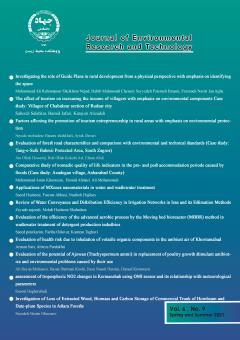Factors affecting the promotion of tourism entrepreneurship in rural areas with emphasis on environmental protection
Subject Areas : environmental economyseyede Mohadese Hatami Shahkhali 1 *
1 -
Keywords: Keywords: Entrepreneurship promotion, tourism, rural areas, environment, East Azerbaijan province,
Abstract :
It can be said that like other spontaneous human activities, entrepreneurship that leads to improving the quality of life and well-being is of great importance. Influential factors play a role in the development and promotion of entrepreneurship, while there are obstacles and challenges for entrepreneurs. The purpose of this study is to identify these factors and study the effective elements. This research is applied in terms of purpose and the results of research in other areas can be used and in terms of the method of work, it is descriptive-analytical. In this research, SPSS software has been used to extract the questionnaire data and a one-sample method has been used to test the hypotheses. The research indicates that there is a significant relationship between institutional and organizational factors, economic factors, managerial factors, social, environmental and cultural factors and the promotion of entrepreneurship in the studied villages.
1. دادورخانی، فضیله، محمدزاده لاریجانی، فاطمه، 1392. ارزیابی پیامدهای اقتصادی و اجتماعی گردشگری خانه های دوم ،پژوهش های جغرافیای انسانی، دوره 45، شماره 4.
2. رضوانی، محمدرضا، 1387، مقدمه ای بر برنامه ریزی روستایی در ایران، تهران، انتشارات قومس.
3. رکن الدین افتخاری، عبدالرضا، پورطاهری، مهدی، فضلی، نفیسه، 1393. تحلیل عوامل مؤثر در توسعه ی کارآفرینی در گردشگری روستایی، مجله برنامه ریزی و توسعه ی گردشگری، سال 3، شماره 8، ص: 87-107.
4. زرافشانی، کیومرث، شرفی، لیدا، گراوندی، شهیر، قبادی، پرستو، بررسی اثرات توسعه گردشگری در ارتقاء شاخص های اقتصادی-اجتماعی نواحی روستایی مطالعه موردی منطقه ریجاب استان کرمانشاه، نشریه اقتصاد فضا و توسعه روستایی، جلد 2، شماره 5.
5. عسگری، رسول، شمس الدینی، علی، کردوانی، پرویز، 1397. ارائه ی مدل آینده نگر کارآفرینی مبتنی بر بوم گردی در روستاهای هدف گردشگری(مطالعه ی موردی: روستاهای هدف شهرستان خور و بیابانک)، فصلنامه برنامه ریزی منطقه ای، سال: 8، شماره: 31، پاییز.
6. عنابستانی، علی اکبر، سعیدی، عباس، درویشی، حسن، 1391، بررسی آثار اقتصادی، اجتماعی، کالبدی و زیست محیطی توسعه گردشگری سکونتگاههای روستایی از دیدگاه گردشگران و روستاییان مطالعه موردی دشت ارژن فارس، مجله برنامه ریزی فضایی جغرافیا، سال 2، شماره 2.
7. غنیان، منصور، خانی، فضیله، بقایی، لیلا، 1390. ارزیابی فضای کارآفرینی در گردشگری روستایی(مطالعه موردی: منطقه اورامان)، پژوهش های روستایی، سال 2، شماره 3، پاییز.
8. قهرمانی، مریم، 1391. توسعه ی گردشگری پایدار روستایی و جایگاه باارزش بافت های روستا، مطالعه ی موردی روستای سیمین شهر همدان، فضای گردشگری، سال 2، ص: 65-80.
9. کریمی، سعید، 1393، کارآفرینی گردشگری کشاورزی، راهبردی نوین برای توسعه روستایی، نشریه کارآفرینی در کشاورزی، جلد اول، شماره 4.
10. محمدی یگانه، بهروز، عینالی، جمشید، بیگدلی، اعظم، 1395. نقش کارآفرینی در توسعه ی مناطق روستایی با تأکید بر گردشگری، دهستان حصار ولیعصر شهرستان آوج، فصلنامه برنامه ریزی منطقه ای، سال6، شماره 21، ص: 193-202،بهار.
11. یاسوری، مجید، 1394. مقدمه ای بر اقتصاد روستایی، انتشارات دانشگاه گیلان، چاپ اول.
12.Borke Tunali, C, Sender, S, 2019. The determinates of entrepreneurship in Turkey, Computer Science, V: 158,P: 648-652.
13.Fredstrom, A, Peltonen, J, Wincent, J, 2020. A country level institutional perspective on entrepreneurship productivity: The effects of informal economy and regulation, Journal of business venturing, V:21, p:1-15.
14.Giannakis, Elias, 2014. The role of rural tourism on the development of rural areas: the case of cyrrus , Romanian journal of regional science, v: 8.
15.Harpa, E, Moca, S, Rus, S, 2016. A comparative study of rural entrepreneurship Romania-Greece, V:22, P:1100-1105.
16.Hwang, JeaHee. & Lee, seong Woo , 2015. The effect of the rural tourism policy on non-farm income in South Korea, Elsevier, V: 46, p: 501-513.
17.Istanbullu, F, Zeki,M, yilmaz, S, 2015. The economic contribution of Turkish tourism entrepreneurship on the development of tourism movements in Islamic countries,Social and behavioral sciences,V:195, P:413-422.
18.Kirkwood, J, Tootell, B, 2008. Is entrepreneurship the answer to achieving work- family balance? , Journal of management & organization, V: 14, p: 285-302.
19.M situmorang, Dohar Bob, Rasfaldini Mirzanti, Isti, 2012. Social entrepreneurship to develop ecotourism, Economics and finance,V: 4,P:398-405.
20.Mantymaa,E,tyrvaien,L,Jautinen,A,Kuittila,M,2019. Importance of forest landscape quality for companies operating in nature tourism areas, Land use policy, p:1-12.
21.Pilving, T, Kull, T, Suskevics, M, Viira, A, 2019. The tourism partnership life cycle in Estonia: Striving towards sustainable multisectoral rural tourism collaboration, Tourism management perspectives, V: 31, P: 2019-230.
22.Slmkova, E, 2007. Strategic approaches to rural tourism and sustainable development of rural areas, University of hardec kralove, CZECH Republic.
23.Razvan Surugiu,M, Surugiu,C,2015. Heritage tourism entrepreneurship and social media: opportunities and challenges,Social and behavioral sciences,V:188, p: 74-81.
24.Talmaciu, M, 2012. Considerations regarding the development of Romanian regional economies through in novation and entrepreneurship, science direct procedia economies and finance 3,p: 914-920.
25.Thelken, H & Jong, G, 2020. The impact of values and future orientation on intention formation within sustainable entrepreneurship, Journal of Cleaner production, V: 226,P: 1-50.
26.Yuan,P, liu,Y, Ju, F, li, X, 2017. A study on farmer’s Agriculture related tourism entrepreneurship behavior, Computer Science,V: 122, P:743-750.

